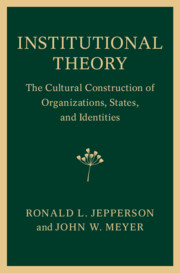Book contents
- Institutional Theory
- Institutional Theory
- Copyright page
- Contents
- Figures
- Preface
- Credits
- Part I Introduction
- Part II Institutional Theory: Its Role in Modern Social Analysis
- Part III The Institutional Level of Analysis
- Part IV Institutions of Modernity and Postmodernity: The Construction of Actors
- 9 The “Actors” of Modern Society:
- 10 Institutional Theory and World Society (2009)
- 11 Reflections on Part IV:
- Part V Conclusion
- Index
- References
11 - Reflections on Part IV:
The Construction of Actors
from Part IV - Institutions of Modernity and Postmodernity: The Construction of Actors
Published online by Cambridge University Press: 22 March 2021
- Institutional Theory
- Institutional Theory
- Copyright page
- Contents
- Figures
- Preface
- Credits
- Part I Introduction
- Part II Institutional Theory: Its Role in Modern Social Analysis
- Part III The Institutional Level of Analysis
- Part IV Institutions of Modernity and Postmodernity: The Construction of Actors
- 9 The “Actors” of Modern Society:
- 10 Institutional Theory and World Society (2009)
- 11 Reflections on Part IV:
- Part V Conclusion
- Index
- References
Summary
Actors and social structures in retrospect. The remarkably unrealistic qualities still attributed to individuals, organizations, and states in much contemporary social science.
- Type
- Chapter
- Information
- Institutional TheoryThe Cultural Construction of Organizations, States, and Identities, pp. 281 - 294Publisher: Cambridge University PressPrint publication year: 2021

